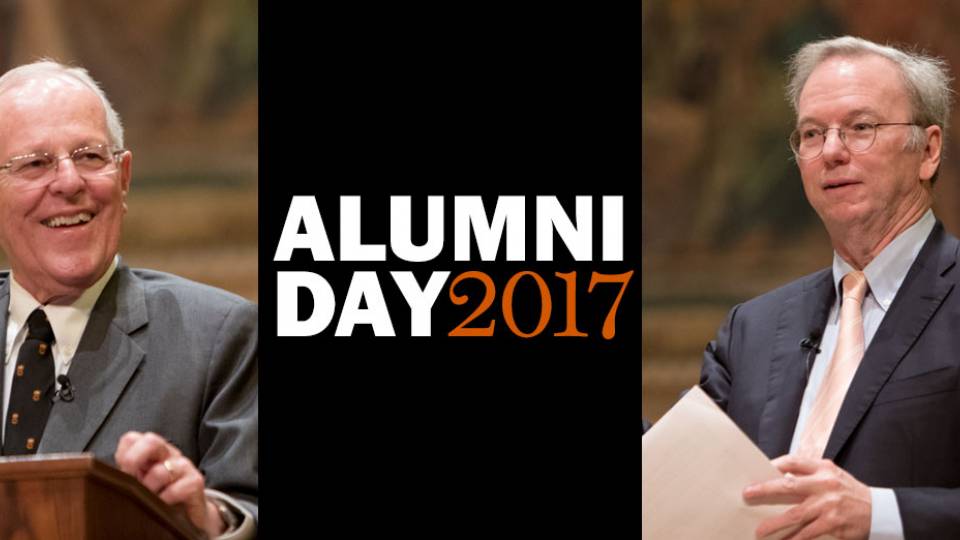Today's college students are poised to influence a "golden age" of
technology that will change the way billions of people worldwide
communicate, work and play, Microsoft Corp. founder Bill Gates told
Princeton University students Friday, Oct. 14.
Gates spoke to an audience of roughly 800 people in Richardson
Auditorium as part of a college tour to share his views on new
frontiers in technology. While at Princeton, Gates received the Crystal Tiger Award
from students for his achievements in business and philanthropy. He
also met with Princeton faculty members to discuss innovations in
computer science education.
"It's really young people coming into this field, who look at things in
a new way or are willing to innovate and drive the breakthroughs, who
will be at the forefront of making this happen. The time frame right
now is the golden age," said Gates, who serves as Microsoft's chairman
and chief software architect.
"There are great dreams about what software can do, and the pace of the field will be determined by fresh young minds --
people who have innovative ways of doing these things," he added.
Gates, who was of college age when he co-founded Microsoft with Paul
Allen, said they envisioned developing software that would make it
easier for people to use personal computers at work and at home, with a
greater ability to connect with others around the world.
"Today we have a billion personal computers in use. We really won't have
achieved that original vision that goes back 30 years ago until we have
6 billion personal computers and devices of all sizes working together
in this great way," he said. "Over the course of this decade, most of
that absolutely will be achieved."

During his address, Gates offered demonstrations of several new
Microsoft technologies and provided an overview of the company's
development efforts in areas such as Internet searching and automated
language translation software.
In a question-and-answer session with students, he commented on a broad
range of subjects including education, copyright issues and civil
liberties. He emphasized the importance of promoting education and
tackling issues of poverty, infrastructure and health in developing
countries and stressed the need to address the societal impact of
technology advances.
"It's very important that this discussion about what technology is
going to do be broadly known, so that it's not just the engineers
deciding how we will apply these things," Gates said.
"I do think that in the past some advances have not been used in the
way they should -- for example, medical technology has not been focused
on the diseases of developing countries in the right way -- and I hope
we don't make other mistakes like that," he said. "Also, there are
going to be huge issues about privacy, how jobs are done, digital
rights management, intellectual property -- we want to get the broad
society into the discussion."
Following his address, senior Sarah Moore, a chemical engineering
major, said, "I was really impressed with some of the new technology
that Bill Gates presented. He was forward-thinking and brought up how
he wanted to get technology out to everyone, not just to the privileged.
"The message that made me think, as a student in engineering, is how we
can not just make technology, but improve technology that will help
people in society as a whole," she added. "We need to think about the
problems he raised, such as world health and sanitation -- not just the
problems that are cool and fun -- and how we are going to really help
people."
Maria Klawe, dean of the School of Engineering and Applied Science,
added, "He really managed to convey how much there still is to happen
with the impact of technology on society and how important software and
computer science is going to be in terms of really changing how we work
and how we live."

In addition to his work with Microsoft, Gates established the Bill
and Melinda Gates Foundation, which has committed billions of dollars
to organizations working in global health and education. The foundation
also established the Gates Millennium Scholars program, which provides
scholarships to undergraduate and graduate students from minority
backgrounds.
For these efforts, Gates was presented with the second Crystal Tiger
Award, given by Princeton undergraduates to an individual who has had a
transformative impact on the world. Former U.S. Secretary of State
Colin Powell received the inaugural award in February 2004.
"Though you are widely respected and hailed around the world, Mr.
Gates, it is in particular our generation of students who identify with
and admire you," senior Thomas Voute, the Crystal Tiger Award student
coordinator, said in presenting the award. "Throughout the last two
decades we have witnessed firsthand the major advances in technology
that altered every aspect of our lives. Your success is not simply that
of the innovator and businessman, but also leader in the global
community."
In introducing Gates' address, Princeton President Shirley M. Tilghman
said, "We welcome not only an outstanding software architect and
entrepreneur, but also someone who, through actions both locally and
globally, is striving to make the world a better place for everyone."
Earlier in the day, Gates met with faculty members from the Department
of Computer Science, Klawe and Tilghman to learn about Princeton's
efforts in developing innovative opportunities for students interested
in studying computer science and engineering.
Among the projects discussed were an integrated series of first-year
courses that combines computer science and engineering with math,
physics, biology and chemistry, as well as a freshman computer science
course that emphasizes real applications of computer science.
"He was really excited about the interdisciplinary approaches we are
taking, particularly our emphasis at the freshman and sophomore
levels," Klawe said. "He was very engaged and really seemed to be very
interested in what we were talking about."
A Webcast of the address will be available on Princeton's Webmedia site.





